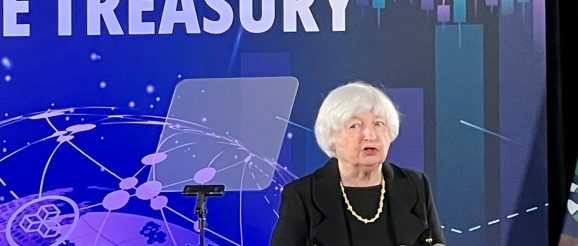Yellen Call for ‘Responsible’ Crypto Innovation Is Right

The U.S. Treasury Secretary noted the sector’s explosive growth from $14 billion to $3 trillion in just five years and its origins, even touching on the original Bitcoin white paper’s solution for preventing the same digital assets being spent twice, a key criticism of systems preceding Bitcoin.
Yellen said that “the government’s role should be to ensure responsible innovation – innovation that works for all Americans, protects our national security interests and our planet, and contributes to our economic competitiveness and growth. Such responsible innovation should reflect thoughtful public-private dialogue and take account of the many lessons we’ve learned throughout our financial history. This sort of pragmatism has served us well in the past and I believe it is the right approach today.”
In a recent interview with the Huffington Post about crypto legislation, I observed that we needed new rules, language and a more elastic framework for initial coin offerings (ICO) consistent with anti-money laundering (AML) and know-your-customer (KYC) rulemaking that would ensure innovation could continue to flourish.
The American Blockchain PAC that I lead as CEO welcomed Secretary Yellen’s sound guidelines for a process of developing a legal and regulatory structure to protect the public while creating a climate that fosters innovation. As it happens, Rep. Glen “GT” Thompson (R-Pa.) has significantly advanced this process by proposing a thoughtful, well-formulated “crypto regulatory blueprint.”
The “Thompson principles” offer a framework for digital commodities exchanges, voluntary registration and qualified digital commodity custodians. They also offer an improved process to create digital commodities; to provide a full accounting of stablecoin assets and liabilities; to protect customers using stablecoins and register asset-backed digital commodity users. They would comply with and apply to pre-sold digital commodities.
“Trading venues would opt into the [Commodity Futures Trading Commission] Digital Commodity Exchange regime or remain regulated under individual state money transmitter licenses. Trading venues will be incentivized to choose CFTC regulation to reduce their regulatory burdens by facing only one regulator, be eligible to offer leveraged trading, and be the point of entry for new digital commodities to the retail public.”
According to the Congressional Research Service, 49 states require registration as money transmitters. It costs millions of dollars and years of working through the bureaucratic labyrinths followed by continuing onerous compliance requirements to make this a reality. This process is prohibitive for most startups, reducing innovation without providing meaningful added public protection. Allowing enterprises to choose “one-stop shopping” honors Secretary Yellen’s counsel of pragmatism.
Congress and the financial services industry finally grasp that cryptocurrency is not just another extraordinary, popular delusion or the result of the madness of crowds. The blockchain (from which cryptocurrencies are fashioned) is fundamental to many important emerging technologies like non-fungible tokens, Web 3, and the metaverse.
And President Joe Biden’s Executive Order on “Ensuring the Responsible Development of Digital Assets” calls for the mitigation of risks while recognizing that “the United States has an interest in ensuring that it remains at the forefront of responsible development and design of digital assets and the technology that underpins new forms of payments and capital flows in the international financial system. …”
The White House, the Secretary of the Treasury and members of Congress, including Rep. Thompson and the chairs of the Congressional Blockchain Caucus – Reps. Bill Foster (D-Ill.), Darren Soto (D-Fla.), Peter Schweikert (R-Ariz.) and Tom Emmer (R-Minn.) – are representatives of the burgeoning distributed ledger sector, as is the American Blockchain PAC.
